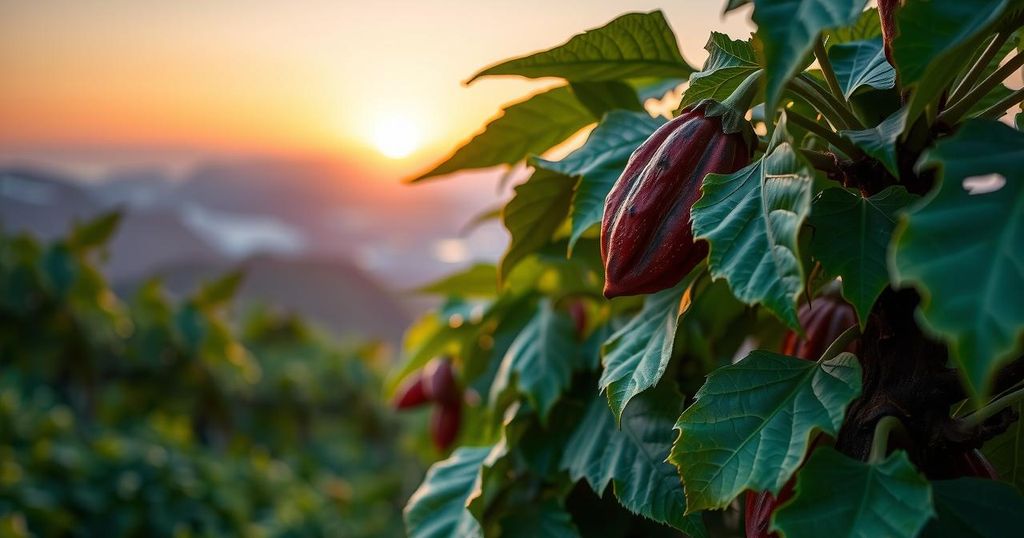Climate Change Threatens Global Chocolate Supply Due to Cacao Crop Decline
A new study reveals that climate change is adversely affecting cacao production in West Africa, crucial for global chocolate supply. Rising temperatures, diseases, and erratic rainfall contribute to reduced harvests and soaring cocoa prices. The report emphasizes the urgent need for action against environmental degradation to secure the livelihoods of cocoa farmers and sustain the chocolate industry.
Recent studies indicate that climate change is severely impacting cacao production in West African nations, which provide around 70% of the global chocolate supply. Rising temperatures, coupled with diseases and unpredictable rainfall, have led to diminished harvests and increased cocoa prices, exacerbating the already strained market. Reports highlight that excessive warmth has persisted longer than normal, particularly affecting cacao trees in Ivory Coast and Ghana.
The research conducted by Climate Central reveals alarming trends, noting that climate-related temperature increases have resulted in an additional three weeks of heat above 32 degrees Celsius during the critical growing season. Last year’s record-breaking temperatures caused excessive heat on at least 42 days across much of the analyzed regions. Furthermore, these extremes negatively impact the quantity and quality of cocoa harvested.
Multiple factors contribute to the rising cocoa prices, including pest infestations and environmental changes, with Christian Aid’s research further emphasizing the vulnerability of farmers. The charity points to erratic weather patterns affecting cropland, transitioning from severe rainfall to extended drought, threatening the livelihoods of cocoa farmers who are often among the poorest globally. Osai Ojigho from Christian Aid remarked on the significant risks facing the farming communities due to climate change.
The cocoa market has reacted to these challenges, with prices soaring since late 2023, significantly outpacing historical averages. Cocoa prices rose above $10,000 per tonne recently, prompting companies like Lindt & Spruengli to announce price increases in response to higher cocoa costs. This situation exemplifies the broader implications of climate change on the global economy and food security, particularly through commodity pricing.
Experts express deep concern over the existential threats posed to cacao crops from increased dryness in producing regions. Narcisa Pricope from Mississippi State University discussed findings showing that more than three-quarters of Earth’s land has become drier in the past 30 years, largely due to greenhouse gas emissions. This reinforces the pressing necessity for collective action aimed at combating environmental degradation and sustaining life on our planet.
In summary, climate change poses a significant threat to cacao production in West Africa, primarily impacting the quality and quantity of cocoa harvested. The resultant increase in cocoa prices and volatility in weather patterns further underscores the risk to farmers’ livelihoods. It is essential to recognize the broader implications of these environmental challenges on global commodities and the need for concerted efforts to mitigate climate impacts.
Original Source: www.sciencealert.com




Post Comment